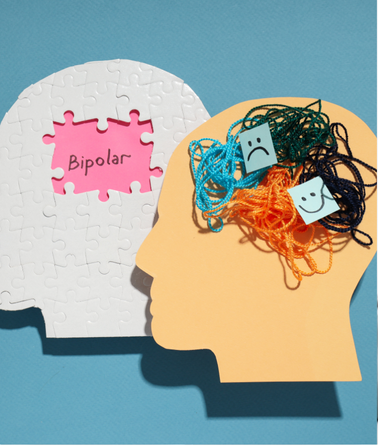What Is Bipolar Disorder? Symptoms, Types, and Trauma Links
At Khiron clinics, we see mental health issues as manifestations of unresolved trauma that leads to a dysregulated nervous system.
What Is Bipolar Disorder?

Bipolar Disorder is a mental illness characterised by extreme mood changes and alternating bipolar episodes. These may include manic symptoms during a manic episode, lighter hypomanic episodes, or depressive episodes that resemble a major depressive episode.
Once referred to as manic depression, it is now classified into subtypes such as Bipolar I Disorder, Bipolar II Disorder, and Cyclothymic Disorder, depending on the pattern and severity of mood symptoms. While it is commonly viewed as a chemical imbalance, emerging research highlights the role of trauma in its development.
Many people with bipolar disorder also live with anxiety disorders or other mental health conditions, making accurate support from a mental health professional essential.
At Khiron Clinics, we believe in treating Bipolar Disorder by addressing these root causes rather than just its symptoms.

Types of Bipolar Disorder
Bipolar Disorder exists on a spectrum, and each type presents differently in how moods, energy, and activity levels fluctuate. Understanding these distinctions helps guide the right support and trauma-informed treatment approach.

Bipolar I Disorder
Characterised by manic episodes that may last a week or longer and can sometimes require hospital care. These highs are often followed by depressive episodes, creating intense cycles of mood instability. Trauma can amplify both the severity and frequency of these episodes.
Bipolar II Disorder
Involves recurring depressive episodes and hypomanic episodes, which are less intense than full mania but still disrupt daily life. Individuals with Bipolar II often experience longer periods of low mood and exhaustion, sometimes misdiagnosed as chronic depression.
Cyclothymic Disorder
A milder but persistent form of bipolarity, Cyclothymia involves frequent mood shifts between hypomanic and depressive symptoms that last for at least two years. Though less extreme, the instability can still deeply affect relationships, work, and self-esteem.
Mixed Episodes and Rapid Cycling
Some people experience mixed episodes, where symptoms of mania and depression occur simultaneously—feeling energised yet despairing, restless yet hopeless. Rapid cycling refers to having four or more mood episodes in a year, often linked to stress or unresolved trauma.
What Causes Bipolar Disorder?
The causes of Bipolar Disorder are complex and multifaceted, involving an interaction between genetic, biological, environmental, and psychological factors. While no single cause explains every case, research shows that both inherited vulnerability and life experience play important roles in how the condition develops and manifests.
Genetic and Biological Factors
A family history of bipolar disorder or other mood disorders significantly increases the likelihood of developing the condition. Studies suggest that genetic predisposition influences how the brain regulates neurotransmitters such as dopamine and serotonin, which are linked to mood, energy, and motivation. However, genetics alone do not determine outcome—many people with a family history never develop bipolar disorder.
Trauma and Environmental Triggers
At Khiron Clinics, we recognise that unresolved trauma can be a major contributing factor. Adverse childhood experiences, emotional neglect, abuse, or prolonged stress can disrupt the nervous system’s ability to regulate emotions effectively. These early imbalances can heighten sensitivity to later life stressors, increasing vulnerability to mood swings and instability.
In adulthood, stressful life events, loss, or relationship breakdowns can also trigger episodes in those with an underlying predisposition. Trauma may not cause bipolar disorder on its own, but it can profoundly influence its severity, frequency, and course.
Substance Use and Lifestyle Factors
For some individuals, the use of alcohol, stimulants, or other recreational drugs can destabilise mood, sleep, and cognition. Substance use can both mask and intensify bipolar disorder symptoms, often leading to more frequent or severe episodes. Over time, this can reinforce cycles of emotional distress and make recovery more challenging.
A Trauma-Informed Perspective
From a trauma-informed standpoint, bipolar disorder symptoms can be understood as the nervous system’s attempt to adapt after prolonged overwhelm. By addressing the emotional and physiological imprints of trauma—rather than focusing only on symptom management—healing becomes more sustainable.

As trauma expert Dr. Gabor Maté reminds us:
“Trauma is not what happens to you, but what happens inside you as a result of what happens to you.”
How Is Bipolar Disorder Diagnosed?
Diagnosing Bipolar Disorder requires a careful and holistic approach. Because symptoms can overlap with other mental health conditions, an accurate diagnosis depends on understanding both emotional patterns and life history.
Clinical Evaluation & Psychiatric Assessment
A thorough psychiatric assessment explores mood fluctuations, sleep changes, behaviour, and energy levels over time. At Khiron Clinics, we also consider the client’s personal and trauma history, recognising that unresolved trauma can mimic or influence bipolar disorder symptoms.
A Trauma-Informed Diagnostic Approach
Rather than viewing symptoms in isolation, we look at how the nervous system has adapted to stress and adversity. Our clinicians explore underlying experiences that may contribute to emotional dysregulation, ensuring treatment plans address root causes, not just labels.
Misdiagnosis Risks
Bipolar Disorder can sometimes be confused with conditions such as Borderline Personality Disorder (BPD), Complex PTSD, or Major Depression—all of which can present with mood instability. A trauma-informed assessment helps distinguish between these patterns, reducing the risk of misdiagnosis and ensuring clients receive the right care from the start.
Common Co-Occurring Conditions
Bipolar Disorder rarely exists in isolation. Many people with bipolar disorder experience additional mental health challenges that interact with mood changes and trauma responses.
Anxiety Disorders: Generalised anxiety, panic attacks, or social anxiety frequently accompany bipolar symptoms, often linked to chronic nervous system hyperarousal.
Post-Traumatic Stress Disorder (PTSD): Traumatic experiences can intensify mood instability and trigger manic or depressive episodes.
Substance Use Disorders: Some individuals turn to alcohol or drugs to manage emotional pain or regulate energy levels, which can worsen symptoms over time.
ADHD and Personality Disorders: Shared features such as impulsivity, restlessness, or emotional dysregulation can complicate diagnosis and treatment.
At Khiron Clinics, our trauma-informed approach recognises the overlap between mental health conditions. By treating the whole person—mind, body, and nervous system—we help clients find clarity, stability, and lasting healing.
How Khiron Clinics Treats the Root Cause of Bipolar Disorder
Our trauma-informed mental health clinic employs a comprehensive approach to healing:
Trauma-Informed Therapy: Advanced therapeutic modalities, including EMDR, Internal Family Systems (IFS), Somatic Experiencing, and Sensorimotor Psychotherapy, are used to process unresolved trauma and regulate emotions effectively.
Initial Consultation: Clients start with an initial consultation with a senior therapist and mental health specialist. This step helps identify the unique factors influencing their condition and ensures we can diagnose bipolar disorder accurately, whether it presents as bipolar I, bipolar II, or co-occurs with other mental disorders such as major depression or seasonal affective disorder. From here, we create a personalised treatment plan.
Holistic Care Plans: We address not only the emotional but also the physical and relational aspects of trauma to ensure comprehensive healing.
Flexible Treatment Options: Our services include a residential program in Wantage, Oxfordshire, for immersive care, as well as outpatient options for those needing greater flexibility.
Long-Term Healing Through Trauma Treatment
At Khiron Clinics, we empower clients to break free from the cycles of mood instability by addressing the trauma underlying Bipolar Disorder. Our approach fosters genuine and lasting recovery, enabling clients to live more balanced and fulfilling lives.
We equip clients with strategies to manage stress, recognise early signs of relapse, and build resilience. Structured routines, participation in support groups, and guidance from a mental health professional form part of the ongoing treatment journey.
For individuals experiencing severe symptoms or overwhelming bipolar disorder experiences, we provide a safe and supportive environment where trauma can be explored without fear or judgment. Clients are supported in making sense of both their manic and depressive symptoms and the way trauma shapes their lives.
With consistent care, community connections, and practical tools, those living with bipolar disorder can move beyond cycles of instability. By addressing trauma at its root, clients discover new pathways toward stability and a more fulfilling future.
If you or someone you know is living with Bipolar Disorder and seeking a mental health clinic that specialises in trauma treatment, Khiron Clinics is here to help. Contact us today to take the first step toward healing.
We work with you to understand your symptoms and help find the issues at the root of your experience, which are usually linked to unresolved trauma. Through finding the source of the issue, we are better equipped to help you on your path to recovery.
Why Choose Khiron Clinics for Bipolar Disorder and Trauma Treatment?

World-Class Expertise: Our therapists are trained by leading trauma specialists, including Dr. Bessel van der Kolk, Dr. Janina Fisher, and Dr. Stephen Porges.
Focus on Root Causes: By treating the origins of trauma, we provide a pathway to sustained recovery rather than temporary symptom relief.
Trauma-Informed Environment: Our entire team, from clinicians to support staff, is trained to provide empathetic, trauma-aware care.

Frequently Asked Questions
While trauma and bipolar disorder can share emotional volatility, trauma stems from overwhelming experiences that dysregulate the nervous system. Bipolar involves cyclical mood changes, but trauma often underlies or amplifies these shifts.
There is no simple “cure,” but trauma-informed treatment can lead to lasting stability, fewer relapses, and improved emotional regulation. Many clients experience significant recovery with the right therapeutic approach.
The length of treatment varies by individual. Some begin noticing changes within weeks, while others engage in ongoing therapy to sustain long-term healing and integration.
It can feel unpredictable and exhausting, with periods of high energy followed by deep lows. With understanding, structure, and trauma-informed care, many people build balanced and fulfilling lives.
Offer empathy and patience rather than advice. Encourage professional help and maintain consistent, compassionate communication—reminding them they are not alone.
Without support, mood swings may intensify, increasing risks of depression, relationship strain, or self-harm. Early, trauma-informed treatment can prevent chronic distress and promote lasting wellbeing.
At Khiron Clinics, we recognise that bipolar disorder often stems from unresolved trauma. Rather than solely managing symptoms, our focus is on addressing the underlying causes of emotional distress. By treating the roots of trauma, we aim to provide a pathway to sustained recovery and long-term stability.
We provide a range of trauma-informed therapies tailored to each individual’s needs. These include Eye Movement Desensitisation and Reprocessing (EMDR), Internal Family Systems (IFS), Somatic Experiencing, and Sensorimotor Psychotherapy. Our clinic is also the world’s first Polyvagal Informed certified residential clinic, ensuring all treatments are grounded in understanding the nervous system’s role in trauma.
No, a formal diagnosis is not required. Our emphasis is on understanding and treating the root causes of mental health challenges, not just managing symptoms. We welcome individuals seeking clarity and healing, regardless of whether they have a specific diagnosis.
During the initial consultation, a senior therapist will explore your history and challenges to create a personalised treatment plan tailored to your needs. This collaborative approach ensures that your treatment journey aligns with your unique experiences and goals.
Yes, in addition to our residential programmes, we offer flexible outpatient services. This allows individuals to receive consistent, trauma-informed care while maintaining their daily routines and responsibilities.
To start, you can contact us via phone or email to learn more about our programmes. Our team is here to support you in taking the first steps towards healing and recovery.
Trauma-informed care is an approach that acknowledges the impact of trauma and prioritizes safety, trust, and empowerment in treatment.
No, Khiron Clinics focuses on understanding and treating the root causes of mental health challenges, not just managing symptoms.
A senior therapist will explore your history and challenges to create a personalised treatment plan tailored to your needs.
We provide EMDR, IFS, Somatic Experiencing, and Sensorimotor Psychotherapy. Khiron Clinics is also the world’s first Polyvagal Informed certified residential clinic, ensuring all treatment, therapists, and staff are trauma-informed.
Yes, we offer flexible outpatient services in addition to our residential program.
Contact us via phone or email to learn more about our programs and begin your healing journey.
Yes, you can download our brochure for more information about our programs and services: Download Brochure.

Download the Brochure
Discover Our Innovative Trauma Recovery Pathway
Next Steps
We Are Here to Help You Find the Path to Effective, Long Lasting Recovery.

Talk to Us
Get in touch with us and share your story if you feel comfortable with someone who will listen. Our team are always here to help.

Book an Initial Consultation
Meet with a senior member of our clinical team and get insights into the root causes of your issues, plus a written summary and treatment recommendation.

Download Our Brochure
Discover our innovative trauma recovery pathway. Find out more about how we treat, what we treat, our clinics, pricing and more.
